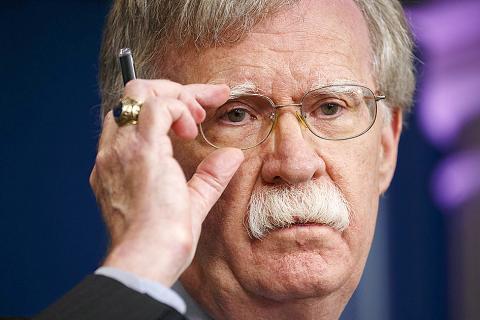Chinese provocations will not win Taiwanese hearts, but will only bring people around the world that cherish democracy closer, White House National Security Adviser John Bolton said in a tweet yesterday.
“Chinese military provocations won’t win any hearts or minds in Taiwan, but they will strengthen the resolve of people everywhere who value democracy. The Taiwan Relations Act [TRA] and our commitment are clear,” Bolton wrote.
Bolton did not elaborate on the US’ commitment to Taiwan.

Photo: Bloomberg
According to the TRA, which serves as the basis of unofficial relations between Taiwan and the US, Washington is obliged to provide Taiwan with defensive weapons.
It must also “maintain the capacity of the United States to resist any resort to force or other forms of coercion that would jeopardize the security, or the social or economic system, of Taiwan’s people,” the act says.
Minister of Foreign Affairs Joseph Wu (吳釗燮) thanked Bolton for his “unwavering friendship and support” in a tweet.
“We’re determined to deal with any reckless military adventure by the bully across the #Taiwan Strait. Provocation only makes us stronger & as you said: ‘Surrender is not an option,’” Wu wrote.
Bolton’s comments came after two Chinese People’s Liberation Army Air Force fighter jets crossed the median line of the Taiwan Strait on Sunday, a rare move that breached a long-held tacit agreement between the two sides.
Military sources said it was the first time since 1999 that the Chinese military had intentionally crossed the median line that separates Taiwan and China.
Commenting on the incident, Pentagon spokesman Lieutenant Colonel Dave Eastburn said the US opposes unilateral actions by any party aimed at altering the cross-strait “status quo,” including “any resort to force or other forms of coercion.”
“Consistent with the Taiwan Relations Act, the United States considers any effort to determine the future of Taiwan by other than peaceful means, including by boycotts or embargoes, of grave concern to the United States,” he said.
The Ministry of National Defense said that the air force scambled five fighter jets to intercept two Chinese J-11 fighter planes that crossed the median line and entered Taiwan’s southwestern airspace at 11am on Sunday.
The J-11 aircraft eventually returned to the Chinese side of the median line after receiving multiple radio warnings.
Ian Easton, a research fellow with the US-based think tank Project 2049 Institute, said the provocation was “further evidence that [Chinese President] Xi Jinping (習近平) is an aggressive and ambitious militarist.”
He said it was a good sign that Washington is beginning to realize Beijing’s threat to Taiwan and to the whole Indo-Pacific region.

Conflict with Taiwan could leave China with “massive economic disruption, catastrophic military losses, significant social unrest, and devastating sanctions,” a US think tank said in a report released on Monday. The German Marshall Fund released a report titled If China Attacks Taiwan: The Consequences for China of “Minor Conflict” and “Major War” Scenarios. The report details the “massive” economic, military, social and international costs to China in the event of a minor conflict or major war with Taiwan, estimating that the Chinese People’s Liberation Army (PLA) could sustain losses of more than half of its active-duty ground forces, including 100,000 troops. Understanding Chinese

The Ministry of Foreign Affairs (MOFA) yesterday said it is closely monitoring developments in Venezuela, and would continue to cooperate with democratic allies and work together for regional and global security, stability, and prosperity. The remarks came after the US on Saturday launched a series of airstrikes in Venezuela and kidnapped Venezuelan President Nicolas Maduro, who was later flown to New York along with his wife. The pair face US charges related to drug trafficking and alleged cooperation with gangs designated as terrorist organizations. Maduro has denied the allegations. The ministry said that it is closely monitoring the political and economic situation

UNRELENTING: China attempted cyberattacks on Taiwan’s critical infrastructure 2.63 million times per day last year, up from 1.23 million in 2023, the NSB said China’s cyberarmy has long engaged in cyberattacks against Taiwan’s critical infrastructure, employing diverse and evolving tactics, the National Security Bureau (NSB) said yesterday, adding that cyberattacks on critical energy infrastructure last year increased 10-fold compared with the previous year. The NSB yesterday released a report titled Analysis on China’s Cyber Threats to Taiwan’s Critical Infrastructure in 2025, outlining the number of cyberattacks, major tactics and hacker groups. Taiwan’s national intelligence community identified a large number of cybersecurity incidents last year, the bureau said in a statement. China’s cyberarmy last year launched an average of 2.63 million intrusion attempts per day targeting Taiwan’s critical

AGING: As of last month, people aged 65 or older accounted for 20.06 percent of the total population and the number of couples who got married fell by 18,685 from 2024 Taiwan has surpassed South Korea as the country least willing to have children, with an annual crude birthrate of 4.62 per 1,000 people, Ministry of the Interior data showed yesterday. The nation was previously ranked the second-lowest country in terms of total fertility rate, or the average number of children a woman has in her lifetime. However, South Korea’s fertility rate began to recover from 2023, with total fertility rate rising from 0.72 and estimated to reach 0.82 to 0.85 by last year, and the crude birthrate projected at 6.7 per 1,000 people. Japan’s crude birthrate was projected to fall below six,